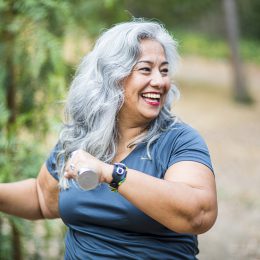How to Know if You Have Too Much Belly Fat
In our older years, almost none of us have the flat stomach we may once have had. But how can you determine if that extra flab poses a serious health risk?

As we grow older, fighting off belly fat can feel like an impossible mission. In the years following menopause, fat tends to migrate from the thighs to the belly. In both sexes, more fat accumulates around our middles with each passing decade, according to a study of more than 10,000 people.
That accumulation can eventually put you at higher risk for serious health problems. As more fat surrounds internal organs like the liver and heart, the likelihood of developing chronic health problems like diabetes and heart disease continues to grow. And if you already have those conditions, belly fat can make them even worse.
But before you start to panic over a little pooch, know this: Some belly fat is normal after age 65, says Sanjay Bhojraj, M.D. He is an interventional cardiologist who runs the Well12.Health metabolic health program.
Find out what experts have to say about how much belly fat is concerning, which types of fat pose the greatest health risks and the lifestyle tweaks that can help you lose it.
Stay active, have fun, get fit — with SilverSneakers! Classes and events are happening right now at participating gyms, online through SilverSneakers LIVE, and at community centers near you. Activate your free online account to get started
How much belly fat is too much?
If you have a tiny pooch that no one really notices but you, the odds are in your favor that it isn’t posing a significant health risk. But a rounder belly that makes it difficult to tuck in your top is more of a health concern, experts say.
According to the National Institutes of Health, a waist circumference above 35 inches in women and 40 inches in men increases your risk for heart disease and type 2 diabetes. But in addition to your waist size, you’ll also want to pay attention to the type of fat you carry around your middle. That makes a huge difference in determining how worrisome your belly fat may be.
Which type of belly fat is most dangerous?
There are two types of belly fat, and one harms your health much more than the other, says Dr. Bhojraj. Here’s what to know about each of them:
- Subcutaneous fat. This fat sis between your skin and abdominal muscles. You can see it and pinch it with your fingers. “This soft, muffin-top fat might concern you aesthetically, but medically it’s less important,” says Dr. Bhojraj. Unlike the second type of fat, subcutaneous fat is less likely to raise your risk for chronic disease, he says.
- Visceral fat. This second fat hides deep in the abdomen, nestled against your stomach, liver, intestines, heart and other organs. This type of fat promotes inflammation, hormone imbalances and diabetes, says Dr. Bhojraj.
Some people have visceral fat packed so deeply that their bellies are still nearly flat, says David Cutler, M.D. He is a board-certified family medicine physician at Providence Saint John’s Health Center in Santa Monica, California. In these people, visceral fat “often goes unrecognized,” he says.
Recommended reading: 8 Top Questions About Belly Fat
How do I figure out which type of belly fat I have?
There are two basic tests that can help you determine what kind of belly fat you have. One you can do at home. The other requires blood work that you’ll undergo with the help of a healthcare professional.
Mirror test. This body check isn’t terribly precise. But it can give you an educated guess — and help you to decide whether a visit to your doctor to see if a bloodwork test is in order, says Dr. Bhojraj.
To do it, check out your reflection in a full-length mirror. If you see grabbable love handles along your waist and back, you’re likely looking at subcutaneous fat. If you see a firm bump along the front of your abdomen — almost as if you were a few months pregnant — you’re probably looking at visceral fat, he says.
Blood marker test. The mirror test isn’t failproof. It can give you a hint of the type of fat you’re carrying, but it won’t tell you whether that fat is harming your health. So if you’re concerned about your belly fat, talk to your healthcare provider about ordering a comprehensive metabolic panel and lipid panel. This blood work will help you to see whether your triglycerides (fat in the blood), cholesterol, and blood sugar levels are elevated — all signs that you’ve got too much visceral fat.
How can I lose my belly fat?
To reign in unhealthy belly fat and improve overall health, Dr. Bhojraj says to take a comprehensive look at your lifestyle. Beyond taking SilverSneakers exercise classes to help you whittle your middle, ask yourself these questions about your other behavioral patterns that could be contributing to your wider-than-you-want waistline.
Am I getting enough sleep?
Lack of sleep can influence appetite, causing you to eat more. In addition to helping prevent belly fat, a regular sleep schedule can also help reduce your risk for heart disease, finds a study published in the Journal of the American Heart Association. When people slept erratically, their risk for developing life-threatening arterial plaque increased.
Experts say that older adults should aim for seven to eight hours of shut-eye every night. If you struggle with insomnia, talk to your health care provider for strategies to help you get the rest your body needs.
Recommended reading: 5 Ways to Fall Asleep and Stay Asleep
Subscribe to our newsletter
It's quick and easy. You could be one of the 13 million people who are eligible.
Already a member? Click to discover our 15,000+ participating locations.
Follow Us
How well am I managing my stress levels?
Too much chronic stress can cause more belly fat to accumulate around your middle, says Dr. Bhojraj. Try strategies like mindfulness meditation, tai chi and yoga to help you wind down when you’re feeling revved up.
What foods do I eat regularly?
If the answer to this one is processed junk food, it’s time to rethink what you put on your plate. According to a study of 1,485 people aged 55 and older, frequent consumption of ultra-processed foods is associated with increased levels of visceral belly fat. Dr. Bhojraj says to minimize your consumption of added sugars and highly processed foods and choose minimally processed whole foods like lean meat, eggs, fish, whole grains, legumes, nuts and seeds.
What time do I eat?
Dr. Bhojraj says that grazing throughout the day and late into the night can make it more challenging to lose belly fat. Plus, research shows that intermittent fasting — or limiting your food intake to a set number of hours — can help reduce heart disease risk factors like high blood pressure and elevated blood glucose.
He recommends consuming all your meals within an 8- to 10-hour window. So, if you have breakfast at 9 am, try to finish dinner between 5 and 7 pm. “This gives your body more time to process what you’ve eaten,” he says.
See our sources:
Aging and belly fat: Nature
Visceral fat and health: The Journal of Physiology
Waist circumference: National Institutes of Health
Hemoglobin A1c after 65: American Diabetes Association
Getting enough sleep: National Institute on Aging
Sleep and heart disease: The Journal of the American Heart Association
Processed foods and belly fat: Clinical Nutrition
Time-restricted eating and health: Trends in Cardiovascular Medicine
Activate Your FREE SilverSneakers Online Account
Get hundreds of free SilverSneakers On-Demand videos and stay in touch with us by creating your free online account. You don’t have to be a SilverSneakers member to get on-demand workout videos, health and fitness tips from SilverSneakers, and more.
SilverSneakers members can go to thousands of nationwide gyms and fitness locations, plus take SilverSneakers LIVE online classes led by specially trained instructors and designed for all fitness levels and abilities – at no additional cost. If you have a Medicare Advantage plan, it may include SilverSneakers. Check your eligibility here.
Already a member? Get your SilverSneakers member ID, search for locations near you, and all the health and wellness resources you need by logging in to your online member account here.





